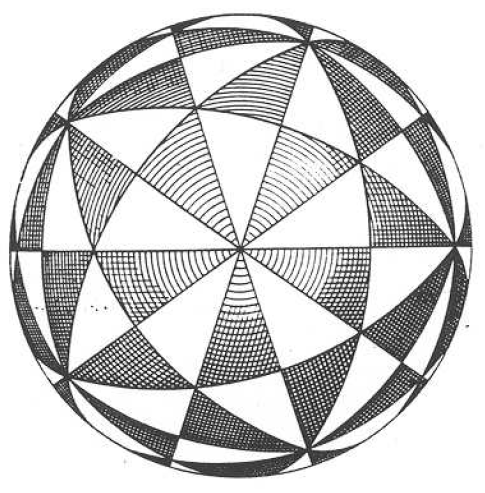Consider the contour integral
\[\frac{1}{2\pi i}\oint_C\frac{(1+z)^n}{z^{k+1}}\,\mathrm dz\]where $C$ is a positively oriented circular contour centered at $z=0$. If we expand the term in the numerator using the binomial theorem, we see that the above integral is
\[\frac{1}{2\pi i}\oint_C\left(\binom{n}{0}+\cdots+\binom{n}{k-1}z^{k-1}+\binom{n}{k}z^k+\binom{n}{k+1}z^{k+1}+\cdots+\binom{n}{n}z^n\right)\frac{1}{z^{k+1}}\,\mathrm dz.\]The coeffcient of the $1/z$ term is $\binom{n}{k}$, so it follows that
\[\frac{1}{2\pi i}\oint_C\frac{(1+z)^n}{z^{k+1}}\,\mathrm dz=\binom{n}{k}.\]The use of this contour integral — and similar integrals — to prove combinatorial identities is known as the Egorychev method, and it can make quick work of difficult identities involving finitie and infinite sums of binomial coefficients. For example, we can easily evaluate the sum
\[\sum_{k=0}^n\binom{n}{k}^2\]as follows
\[\begin{align*}\sum_{k=0}^n\binom{n}{k}^2 &= \frac{1}{2\pi i}\oint_C\frac{(1+z)^n}{z}\sum_{k=0}^n\binom{n}k\frac{1}{z^k}\,\mathrm dz\\ &= \frac{1}{2\pi i}\oint_C\frac{(1+z)^n}{z}\left(1+\frac{1}{z} \right )^n\,\mathrm dz \\ &=\frac{1}{2\pi i}\oint_C\frac{(1+z)^{2n}}{z^{n+1}}\,\mathrm dz \\ &= \binom{2n}{n}.\end{align*}\]Hence we have
\[\sum_{k=0}^n\binom{n}{k}^2=\binom{2n}{n}.\]Further examples
Lets prove that
\[\sum_{k=0}^n k\binom{n}{k}^2=n\binom{2n-1}{n}.\]First note that by differentiating
\[(1+x)^n=\sum_{k=0}^n\binom{n}{k}x^k\]we get
\[n(1+x)^{n-1}=\sum_{k=0}^nk\binom{n}{k}x^{k-1}.\]Then multiplying each side by x yields
\[nx(1+x)^{n-1}=\sum_{k=0}^nk\binom{n}{k}x^k.\]Now let $n\geq1$,
\[\begin{align*}\sum_{k=0}^nk\binom{n}{k}^2 &= \sum_{k=0}^n\frac{k}{2\pi i}\binom{n}{k}\oint_C\frac{(1+z)^n}{z^{k+1}}\,\mathrm dz \\&= \frac{1}{2\pi i}\oint_C\frac{(1+z)^n}{z}\sum_{k=0}^nk\binom{n}{k}\frac{1}{z^k}\,\mathrm dz \\&= \frac{1}{2\pi i}\oint_C\frac{(1+z)^n}{z}\cdot \frac{n}{z}\left(1+\frac{1}{z} \right )^{n-1}\,\mathrm dz \\&= \frac{n}{2\pi i}\oint_C\frac{(1+z)^{2n-1}}{z^{n+1}}\,\mathrm dz \\&= n\binom{2n-1}{n}.\end{align*}\]A Fibonacci identity
In order to show that
\[\sum_{k=0}^n\binom{n+k}{2k}=F_{2n+1}\]we may make use of
\[\binom{n}{k}=0\;\text{if}\;k>n\]and Binet’s formula. Let $\phi=(1+\sqrt{5})/2$ and $\bar{\phi}=(1-\sqrt{5})/2$, then
\[\begin{align*}\sum_{k=0}^n\binom{n+k}{2k} &=\sum_{k=0}^\infty\binom{n+k}{2k} \\ &=\sum_{k=0}^\infty\frac{1}{2\pi i}\oint_C\frac{(1+z)^{n+k}}{z^{2k+1}}\,\mathrm dz \\ &=\frac{1}{2\pi i}\oint_C\frac{(1+z)^n}{z}\sum_{k=0}^\infty\left(\frac{1+z}{z^2}\right)^k\,\mathrm dz \\ &=\frac{1}{2\pi i}\oint_C\frac{z(1+z)^n}{z^2-z-1}\,\mathrm dz, \\ &\qquad\text{where }C\text{ encircles the poles at }\phi\text{ and }\bar{\phi} \\ &=\frac{1}{2\pi i}\oint_C\frac{z(1+z)^n}{(z-\phi)(z-\bar{\phi})}\,\mathrm dz \\ &=\frac{\phi(1+\phi)^n}{\phi-\bar{\phi}}+\frac{\bar{\phi}(1+\bar{\phi})^n}{\bar{\phi}-\phi} \\ &=\frac{\phi(1+\phi)^n-\bar{\phi}(1+\bar{\phi})^n}{\sqrt{5}} \\ &=\frac{\phi\cdot\phi^{2n}-\bar{\phi}\cdot\bar{\phi}^{2n}}{\sqrt{5}} \\ &=F_{2n+1} \end{align*}\]as was desired.
